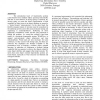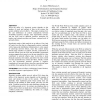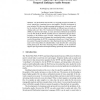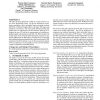110
click to vote
HT
1996
ACM
15 years 6 months ago
1996
ACM
Computing support forlargeengineeringenterprisesprovides an example of the need for hypermedia-based collaborative computing systems composed of a large number of distributed hete...
117
Voted
HT
1998
ACM
15 years 7 months ago
1998
ACM
The presentation layer of hypermedia systems could benefit from standard object querying functionality and this is most effective if strong typing is enforced. By strong typing we...
127
Voted
UML
1999
Springer
15 years 7 months ago
1999
Springer
Abstract. The acceptance of UML as a de facto standard for the design of object-oriented systems, together with the explosive growth of the World Wide Web has raised the need for U...
121
click to vote
HT
1999
ACM
15 years 7 months ago
1999
ACM
When the utility of a hypertext system depends on the number of users and amount of data in the system, the system exhibits network effects. This paper examines how the core diffe...
143
click to vote
OHS
2001
Springer
15 years 7 months ago
2001
Springer
Abstract. The World Wide Web (WWW) was originally designed to handle relatively simple files, containing just text and graphics. With the development of more advanced Web browsers...
113
Voted
HT
2004
ACM
15 years 8 months ago
2004
ACM
This paper presents applications of HyCon, a framework for context aware hypermedia system. The HyCon architecture encompasses annotations, links, and guided tours associating loc...
122
Voted
HT
2005
ACM
15 years 8 months ago
2005
ACM
Hypermedia systems’ researchers investigate the various approaches in the way documents and resources are linked, navigated and stored in a distributed environment. Unfortunatel...
110
Voted
HT
2005
ACM
15 years 8 months ago
2005
ACM
Conversion between different adaptive hypermedia systems has barely been proposed, yet alone tested in realistic settings. This paper presents the evaluation of the interoperabili...
113
Voted
ICALT
2006
IEEE
15 years 8 months ago
2006
IEEE
This paper investigated whether learner’s personality features might have effects on uses of Web-based Hypermedia Systems, which has been used in the electronic learning (e-Lear...
103
Voted
ER
2007
Springer
15 years 8 months ago
2007
Springer
Many hypermedia models have been proposed, including those specifically developed to model navigational aspects of web sites. But few hypermedia systems have been implemented base...





